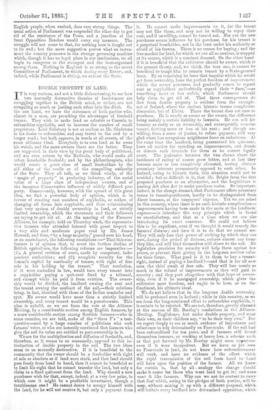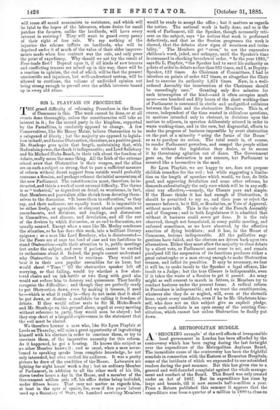DOUBLE PROPERTY IN LAND.
TT is very-curious, and not a little disheartening, to see how
two mutually destructive theories of land-tenure are struggling together in the British mind, or rather, are not struggling so much as jostling each other into the ditch. On the one hand, we have the statesmen of both parties who, almost to a man, are preaching the advantages of freehold tenure. They wish to make land as saleable as Consols, to enfranchise copyholds, and to increase the number of small proprietors. Lord Salisbury is not as zealous as Mr. Gladstone in his desire to enfranchise, and may travel to the end by a longer road ; but both approve, in words at all events, of the same ultimate ideal. Everybody is to own land as he owns his watch, and the more owners there are the better. They are supported in their view by the great body of politicians, and are even outrun by the Radicals, who would make all urban leaseholds freehold ; and by the philanthropists, who would create a great class of small freeholders by the aid either of the credit or of the compelling authority of the State. They all talk, as we think wisely, of the " magic of property" in producing industry, of the social value of a large class of independent owners, and of the immense Conservative influence of widely diffused pro- perty. Concurrently, however, with the spread of this great idea, we find a powerful body of opinion, which is in favour of creating vast numbers of copyholds, or rather, of changing all farms into copyholds, and thus reintroducing that very system of double ownership in land, or strictly limited ownership, which the statesmen and their followers are trying to get rid of. At the meeting of the Farmers' Alliance, for example, held on Thursday week, the representa- tive farmers who attended listened with great iespect to a very able and moderate paper read by Mr. James Howard, and then, "by a large majority," passed over his head, as an amendment, the following resolutions :—" That this con- ference is of opinion that, to avert the further decline of British agriculture, the following reforms are imperative :- (1), A general revision of rents, made by competent, inde- pendent authorities ; and (2), complete security for the tenant's capital by continuity of tenure, with right of free sale in his holding by the tenant." That resolution, if it were embodied in law, would turn every tenant into a copyholder paying a quit-rent fixed by a tribunal, and exempt while he paid it from eviction. The owner- ship would be divided, the landlord owning the rent and thestenant owning the usufruct of the soil,—their relations being, in fact, identical with those of the Indian zemindar and ryot. No owner would have more than a strictly limited ownership, and every tenant would be a parcel-owner. This plan is upheld, as we see from the vote at the Alliance Meeting, by a considerable section among English farmers, by a more considerable section among Scottish farmers—who in some counties, we are told, make of the "three F's " a test- question—and by a large number of politicians who seek farmers' votes, or who are honestly convinced that farmers who give the soil its value are entitled to part-ownership in it.
Wiare for the multiplication and diffusion of freeholds, and, therefore, as it seems to us necessarily, opposed to this in- troduction- of double property in the soil. The two ideas seeni to us mutually destructive. If it is beneficial to the community that the owner should be a freeholder with right of sale as absolute as if land were stock, and that land should pass freely from hand to hand, then it cannot be beneficial so to limit his right that he cannot transfer the land, but only a claim to a fixed quit-rent from the land. Why should a new purchaser wishlor that,,except, indeed, at a very low price, in which case it might be a profitable investment, though a troublesome one? He cannot desire to occupy himself with the land, for he mill not receive it, but only a payment from
it. He cannot make improvements on it, for the tenant may not like them, and may not be willing to repay their cost, and if unwilling, cannot be turned out. Nor can the new' purchaser secure influence by his purchase, for his tenant is a perpetual leaseholder, not in the least under his authority or afraid of his frowns. There is no reason for buying ; and the free market for land, for which we are all so anxious, is stopped at its source, which is a constant demand. On the other hand' if it is beneficial that the cultivator should be owner, which iS the present theory, and, we think, the true one, it cannot be beneficial to tempt him to remain tenant by a State-granted lease. By so remaining he loses that impulse which he would get from ownership, loses the perfect freedom of improvement which the owner possesses, and gradually comes to regard- rent as copyholders undoubtedly regard their " fines,"—as something more or less unfair, which Parliament should help them to get rid of. That these consequences do flow from double property is evident from the example. not of Ireland, where the ancient historic tenure complicates discussion, but of Ulster. There the tenant does not care to purchase. He is nearly as secure as the owner, the difference being mainly a certain liability to lawsuits. He can sell his tenancy as easily as an ownership, and consequently remuina tenant, fretting more or less at his rent ; and thceigh un- willing, from a sense of justice, to refuse payment, still very gled when less scrupulous neighbours force on reductions: At the same time the landlord, being guaranteed his quit-rent, loses all motive for spending on improvements, and dreads • or detests such demands for them as he cannot legally avert. The jealousies between the two classes about the incidence of rating of course grow bitter, and at last they become more or less completely alienated, having obvious pecuniary interests permanently opposed to each other. In Ireland, owing to historic facts, this situation could not be avoided ; but so difficult is it, that Mr. Bright from the first proposed purchase as an alternative, and the Legislature is passing Act after Act to make purchase easier. So important, indeed, is the change deemed, that Parliament offers pecuniary terms to tenant-purchasers, hardly to be distinguished from direct bonuses, at the taxpayers' expense. Yet we are asked in this country, where there is no such historic complication— improvements having been made in the main at the landlords' expense—to introduce the very principle which is found so unsatisfactory, and that at a time when we are also introducing its exact converse. We could not believe this to be expedient, even if we thought it would remedy the. farmers' distress ; and how it is to do that we cannot see. They will only lose that power of striking by which they can now, during the period of distress, enforce almost any terms they like, and will bind themselves still closer to the soil. No legislative provision for security will help them against low prices, or prevent their giving in the long-run auction value for their farms. What good is it to them to buy a tenant- right, instead of paying a landlord ?—and that is for all new- men the chief result of free sale. They will lose nearly as much in the refusal of improvements as they will gain in security ; and they part altogether with that hope of owner- ship, even if it be mortgaged ownership, which gives. the' cultivator most freedom, and ought to be here, as on the- Continent, his ultimate ideal.
We do not believe that in the long-ran double ownership will be preferred even in Ireland ; while in this country, as wee see from the long-continued effort to enfranchise copyholde, it is certain to be rejected. We are not, therefore, greatly alarmed- at the success of Mr. Barclay's resolutions in the Alliance. Meeting. Englishmen fret under double property, and want their own, as their children say, "to be their very own." But we regret deeply to see so much evidence of impatience and reluctance to rely determinedly on Free-trade. If the soil had been enfranchised for ten years, and if farmers still found" themselves insecure, or working at heavy loss, a scheme 'such as that put forward by Mr. Barclay might seem opportune- even if it were inexpedient. But we have as. yet seen no Free-trade in land, do not know how enfranchisement will work, and have no evidence of the effect which. the rapid transmission of the soil from hand to . hand will have upon the position of the farmer. All we know- for certain is, that. by all, analogy the chaege . should make it easier for those who 'want land to -get---ite and' none- want it like farmers. Why can we not-be content:to err that firstwhich, owing to the pledges of bieth parties, will be easy, without mixing it up with a diffdrent proposal. which will irritate every landlord into determined -opposition, which. will rouse all sound economists to resistance, and which will be fatal to the hopes of the labourers, whose desire for small patches the farmers, unlike the landlords, will have every interest in resisting ? They will want to guard every penny of their right of free sale. We say nothing of the injustice the scheme inflicts on landlords, who will be deprived under it of mach of the value of their older improve- ments made when free contract was the rule, and only press the point of expediency. Why should we not try the result of Free-trade first? Depend upon it, if all kinds of new tenures and conflicting tenures are mixed up in this way, there will be a reaction in opinion, the end of which will be that the present unscientific and injurious, but well-understood system, will be allowed to continue, the volume of undivided opinion not being strong enough to prevail over the selfish interests bound up in every old abuse.







































 Previous page
Previous page